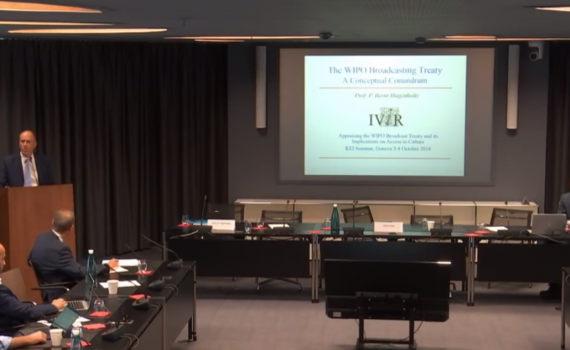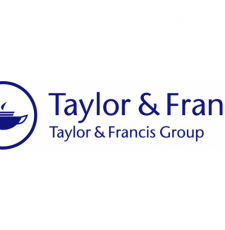
Unless the proposed WIPO treaty on the protection of television broadcast organizations has robust mandatory user rights, access to broadcast material in libraries for uses such as research and study, civic education and community information will be irrevocably harmed, said Teresa Hackett, EIFL Copyright and Libraries Programme Manager, at a recent seminar on the proposed WIPO (World Intellectual Property Organization) broadcast treaty.
“It will become more difficult for libraries to clear rights to show TV documentaries and live broadcast events, for example, and it will be more costly because libraries and other publicly funded institutions will have to pay for the privilege,” continued Teresa. “As a result, access to broadcasts of high social and historical value to teachers, students and the general public will be reduced.”
The cautionary warning was made during a seminar, ‘Appraising the WIPO Broadcast Treaty and its Implications on Access to Culture’ organized by Knowledge Ecology International in Geneva on 3-4 October 2018. [Watch the video of Teresa speaking at the seminar, and download the slides of her presentation.]
In a forthright keynote address, ‘The WIPO Broadcasting Treaty. A Conceptual Conundrum’, Professor P. Bernt Hugenholtz, Institute for Information Law (IViR), University of Amsterdam, noted that justification for devising a new neighbouring right for broadcasters is increasingly hard to see.
In his paper, Prof Hugenholtz highlighted three weaknesses of the proposed new treaty: economic (in the digital age, the technical costs of distributing audiovisual content are approaching zero), definitional (a draft text that is unable to clearly define its subject matter and right holder should probably not exist), and pragmatic (broadcasters in most countries already enjoy solid legal protection against signal piracy and other unauthorized uses).
IMPORTANT ISSUES FOR LIBRARIES
In addition, Prof Hugenholtz spoke about two issues important to libraries: limitations and exceptions (L&Es) and orphan works (where the rightsholder cannot be identified or found).
On L&Es, these should arguably be framed more strongly than in the past because of the trend towards automatic enforcement of rights by ‘robots’ that do not in effect recognize exceptions. On orphan works, Prof Hugenholtz agreed that libraries should be concerned about a new right that will inevitably create more orphans, especially if the term of protection is of substantial duration. [Watch the video of Prof Hugenholtz delivering his keynote address.]
Heijo Ruijsenaars, Chair, WIPO Broadcaster Treaty Working Group of the World Broadcasters Unions explained the case for broadcast organizations. Current international protection is outdated, he said, when consumers nowadays want to watch TV programmes at their chosen time and place on multiple platforms, broadcast signal piracy is on the increase, and the investment of broadcasters must be protected.
While the rights and wrongs of the proposed treaty were debated by stakeholders during the 1.5 day seminar, two important points emerged. First, if the treaty was limited to protecting the broadcast signal (the tool by which the programme is delivered) rather than extending to the content that is broadcast (so-called post-fixation rights), the proposal would be far less controversial, and the treaty “could be adopted next year”. Second, limitations and exceptions are important also to broadcasters - exceptions to the signal should track exceptions to the broadcast works (in order not to impede access to the content).
In closing reflections from the standpoint of a government negotiator, Erry Prasetyo, Second Secretary of the Permanent Mission of Indonesia pinpointed lack of evidence and confusion as the main reason why negotiations on the treaty are taking so long. Since a treaty negotiation is a public policy exercise, he said, governments must clearly understand the costs and benefits to all stakeholders. However many unsettled questions remain. [Watch the video of the closing reflections.]
One ultimate way to resolve the conundrum of the broadcast treaty was offered by Prof Hugenholtz - abandon work on the treaty and move on to other more pressing IP issues.
ABOUT THE SEMINAR
‘Appraising the WIPO Broadcast Treaty and its Implications on Access to Culture’ was a seminar organized by Knowledge Ecology International in Geneva on 3-4 October 2018.
The seminar had four main themes: the history and context of the negotiations at WIPO, the rationale, beneficiaries and scope of the proposed treaty, the rights granted and the limitations and exceptions to the rights, the term of protection and the impact on the public domain. Speakers came from diverse backgrounds including governments, inter-governmental organizations, NGOs, broadcast organizations and academia.
Links to the webcast, presentations and current negotiating text.
Background
A WIPO treaty for the protection of broadcast organizations has been discussed at WIPO since 1996. The treaty sets out to update international rules to protect broadcast organizations against theft of their broadcast signal by creating a new related (or neighbouring) right to copyright.
Read more about the broadcast treaty in EIFL’s blog on SCCR/36, Action at WIPO!
Negotiations on the broadcast treaty will continue at the next session of WIPO’s Standing Committee on Copyright and Related Rights (SCCR/37) that takes place in Geneva from 26 - 30 November 2018. EIFL is participating in SCCR/37.
SHARE / PRINT









